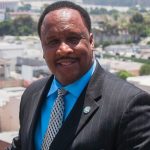While Governor’s Office Promises Quick Response, 2 of His State Agencies Lag and Office of Ethically Challenged Inglewood Mayor is Silent
California has the nation’s toughest laws to reduce carbon pollution. But despite wildfires, floods and drought made worse by climate change, the Air Resources Board (CARB) last week approved a billionaire’s plan to crash through the state’s stringent goals.
Apparently for reasons of pride and profit, former Microsoft CEO Steve Ballmer — the 15th richest person in the world with a $55B net worth — wants to finance the building of a new sports arena for his Los Angeles Clippers basketball team in Inglewood, California. CARB’s decision is curious, however, because it leaves growing concerns about increased pollution levels in low-income Inglewood largely unaddressed.
In our last post, we identified the people who enabled this surprise decision:
 Inglewood Mayor James Butts. He has been accused in a lawsuit of using a bait-and-switch tactic to wrest control of land for Ballmer’s proposed arena away from its prior owner. Butts also hired a former campaign worker as his executive assistant and paid her $342,000 last year before she was fired and escorted from the building. Her job duties and performance remain unclear.
Inglewood Mayor James Butts. He has been accused in a lawsuit of using a bait-and-switch tactic to wrest control of land for Ballmer’s proposed arena away from its prior owner. Butts also hired a former campaign worker as his executive assistant and paid her $342,000 last year before she was fired and escorted from the building. Her job duties and performance remain unclear.- Powerful Sacramento lobbyist Jason Kinney, who is a close friend of Governor Gavin Newsom and described as a “Capitol fixer.” Newsom has been an outspoken proponent of cutting California’s carbon pollution levels. He vowed to stay neutral in the regulatory debate over the proposed arena. But we have learned that Ballmer had hired Kinney to push the project with key Newsom staff, including Deputy Chief of Staff Lindsey Cobia.
- CARB Chief of Transportation Planning Nicole Dolney, who has overseen and directed staff evaluation of Ballmer’s application.
To understand more about how CARB’s decision was made, Checks and Balances Project requested decision-making records from the four government entities at which the enablers work or have close ties. These include Governor Newsom’s office, the Governor’s Office of Planning and Research, the city of Inglewood and of course, CARB. State records law requires government agencies to respond within 10 calendar days —by December 5th in our case — to acknowledge the records request and tell the requesters whether they have disclosable public records.
The responses of each enabling agency – and specifically when we can anticipate records sought, including email and text messages – are interesting when compared with each other.

The Air Resource’s Board response is particularly telling, given the pivotal role the agency played in giving Ballmer his surprise win. It’s also unacceptable from a public information standpoint. We’re examining our options about shortening CARB’s response time. The City of Inglewood’s silence is also unacceptable. We don’t want anyone to run out the clock and prevent the public from finding out in a timely way how and why Ballmer got a surprise approval.
Do you have information to share? Send us a note through our confidential tip line.
Scott Peterson is executive director of Checks and Balances Project, an investigative watchdog blog holding government officials, lobbyists and corporate management accountable to the public. Funding for C&BP is provided by Renew American Prosperity and individual donors.
You May Want to Read:
Will Microsoft Billionaire Gut California’s Carbon Pollution Standards for a Basketball Arena?







Recent Comments